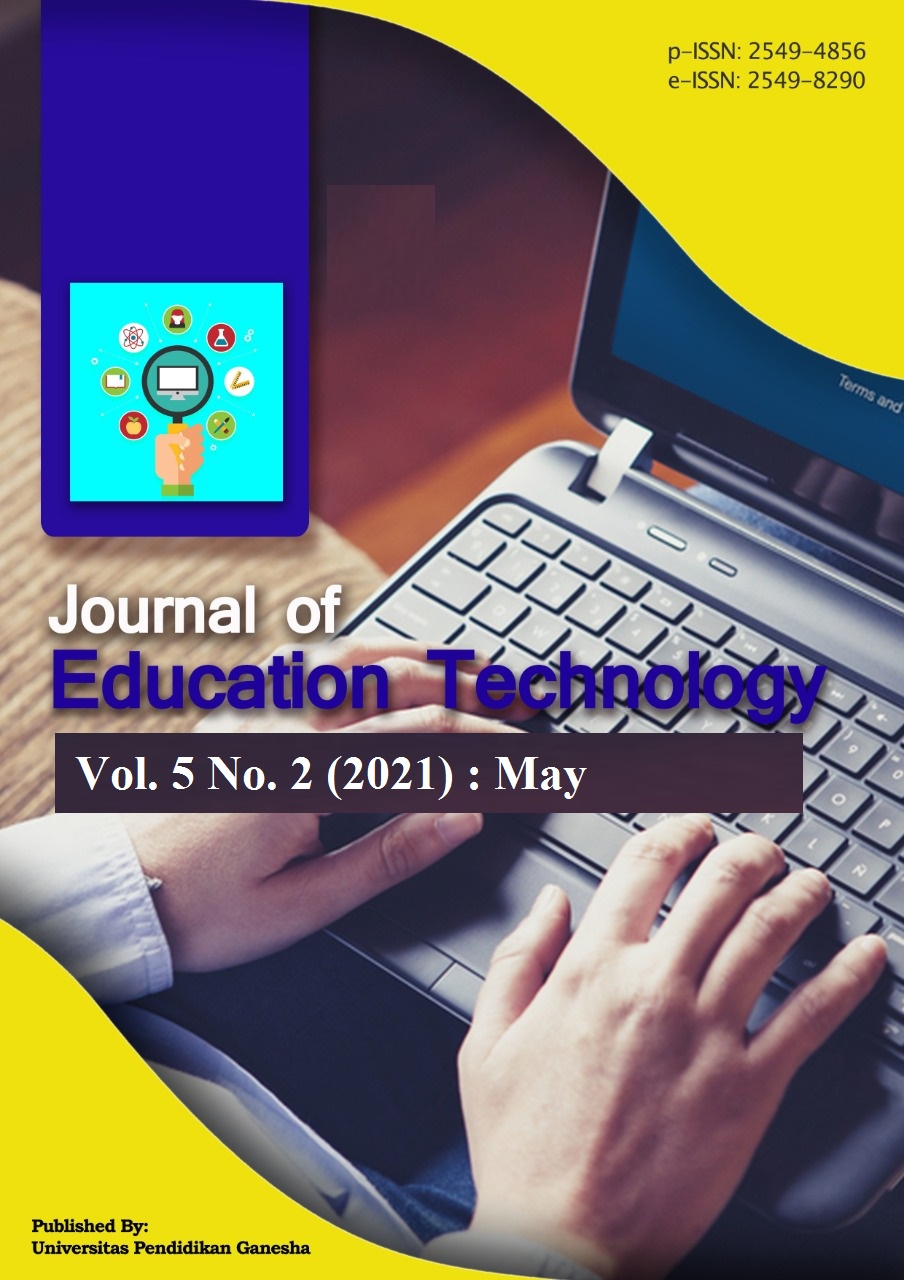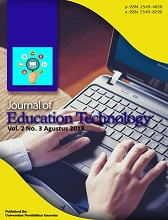The Development of Advance Organizer Based Distance Learning in Chemistry Bonding Material
DOI:
https://doi.org/10.23887/jet.v5i2.33613Keywords:
Online Learning, Advance Organizer, Chemical BondingAbstract
The spread of the Covid-19 virus requires the government to take a policy of organizing education online. Learning chemical bonding material is strived to be developed according to students' needs and learning objectives reflected in the curriculum. This study aims to develop advance organizer-based distance learning on chemical bonding material and measure the effectiveness of this product. This study uses the Dick and Carey development model approach. The test subjects in this study were 39 students in class X students of laboratory testing analysis competency for the 2020/2021 academic year. The instruments used included assessment questionnaires, observations, interviews, validation sheets, and students' cognitive knowledge tests. The data obtained were analyzed using quantitative descriptive statistics and data on the effectiveness of learning using an n-gain score. This study obtained online learning products with an average validation score of 3.51 on a scale of 4.00, and the student gain value before and after using advance organizer-based online learning was 0.52. This research concludes that advanced organizer-based online learning products on chemical bonding material are very feasible and practical. These findings will be an input for developing chemical bonding materials and research the development of chemistry learning during a pandemic.
References
Alavudeen, S. S., Easwaran, V., Mir, J. I., Shahrani, S. M., Aseeri, A. A., Khan, N. A., & Asiri, A. A. (2021). The influence of COVID-19 related psychological and demographic variables on the effectiveness of e-learning among health care students in the southern region of Saudi Arabia. Saudi Pharmaceutical Journal, 9. https://doi.org/10.1016/j.jsps.2021.05.009.
Andriyani, N. L., & Suniasih, N. W. (2021). Development Of Learning Videos Based On Problem-Solving Characteristics Of Animals And Their Habitats Contain in Science Subjects On 6th-Grade. Journal of Education, 5(1), 37–47. http://dx.doi.org/10.23887/jet.v5i1.32314.
Ayuni, I. A. S., Kusmariyatni, N., & Japa, I. G. N. (2017). Pengaruh Model Pembelajaran Talking Stick Berbantuan Media Question Box Terhadap Hasil Belajar IPA Kelas V. Journal of Education Technology, 3(1). http://dx.doi.org/10.23887/jet.v1i3.12503.
Boesdorfer, S. B. (2019). Growing Teachers and Improving Chemistry Learning: How Best Practices in Chemistry Teacher Education Can Enhance Chemistry Education. ACS Symposium Series, 1(1). https://doi.org/10.1021/bk-2019-1335.ch001.
Dick, W., Carey, L., & Carey, J. O. (2015). The Systematic Design Of Instruction (8 ed.). America: The United States of America.
Elfeky, A. I. M., Masadeh, T. S. Y., Articles, R., Model, R. Q. in E. E. through the F. C., Procedia Computer Science, Volume 172, 2020, pp. 906-914, Details, D. Pdfv., … Elbyaly, M. Y. H. (2020). Advance organizers in flipped classroom via e-learning management system and the promotion of integrated science process skills. Thinking Skills and Creativity, 35. https://doi.org/10.1016/j.tsc.2019.100622.
Fuadi, H., Robbia, A. Z., Jamaluddin, J., & Jufri, A. W. (2020). Analisis Faktor Penyebab Rendahnya Kemampuan Literasi Sains Peserta Didik. Jurnal Ilmiah Profesi Pendidikan, 5(2). https://doi.org/10.29303/jipp.v5i2.122.
Herawati, N. S., & Muhtadi, A. (2018). Pengembangan Modul Elektronik (E-Modul) Interaktif Pada Mata Pelajaran Kimia kelas XI SMA. Jurnal Inovasi Teknologi Pendidikan, 5(2), 180–191. https://doi.org/10.21831/jitp.v5i2.15424.
Jayadiningrat, M. G., & Ati, E. K. (2018). Peningkatan Keterampilan Memecahkan Masalah Melalui Model Pembelajaran Problem Based Learning (Pbl) Pada Mata Pelajaran Kimia. Jurnal Pendidikan Kimia Indonesia, 2(1), 1. https://doi.org/10.23887/jpk.v2i1.14133.
Joyce, B., Weil, M., & Calhoun, E. (2016). Models of Teaching (9 ed.). Yogyakarta: Pustaka Pelajar.
Kalantarrashidi, S. A., Mohammadpour, E., & Sahraei, F. (2015). Effect of Blended Learning Classroon Environment on Student’s Satisfaction. Journal of Educaion and Training Studies, 3(5), 225–230. https://doi.org/10.11114/jets.v3i5.1013.
Kaplan, D. E. (2018). Piagetian Theory in Online Teacher Education. Scientific Research Publishing, 9(6). https://doi.org/10.4236/ce.2018.96061.
Kimianti, & Prasetyo. (2019). Pengembangan E-Modul IPA Berbasis Problem Based Learning Untuk Meningkatkan Literasi Sains Siswa. Kwangsan Jurnal Teknologi Pendidikan, 7(2). https://doi.org/10.31800/jtp.kw.v7n2.p91--103.
Kurtz, G., Tsimerman, A., & Steiner, O. (2014). The Flipped Classroom Answer to Future Learning? European Journal of Open, Distance and E-Learning, 17(2). https://doi.org/10.2478/eurodl-2014-0027.
Lase, D. (2019). Pendidikan di Era Revolusi Industri 4.0. Jurnal Sundermaan, 1(1). https://doi.org/10.36588/sundermann.v1i1.18.
Lasminiasih, D. (2016). Perancangan Sistem Informasi Kredit Mikro Mahasiswa Berbasis Web. Jurnal Sistem Informasi (Journal of Information System), 8(1), 883–893. https://doi.org/10.36706/jsi.v8i1.2957.
Lin, H., & Chen, T. (2016). Decreasing cognitive load for novice EFL learners: Effects of question and descriptive advance organizers in facilitating EFL learners’ comprehension of an animation-based content lesson. System, 34(3). https://doi.org/10.1016/j.system.2006.04.008.
Lukitasari, Purnamasari, Utami, & Sukri. (2019). Blended-Problem-Based Learning: How its impact on students’ critical thingking skills? Jurnal Pendidikan Biologi Indonesia, 5(3), 425–434. https://doi.org/10.22219/jpbi.v5i3.10048.
Lukman, & Ishartiwi. (2014). Pengembangan Bahan Ajar Dengan Model Mind Map Untuk Pembelajaran Ilmu Pengetahuan Sosial SMP. Jurnal Inovasi Teknologi Pendidikan, 1(2). https://doi.org/10.21831/tp.v1i2.2523.
Mardiah, A. (2016). Penggunaan Model Pembelajaran Advance Organizer Dalam Meningkatkan Hasil Belajar Siswa Pada materi Struktur Atom. Lantanida Journal, 4(2). https://doi.org/10.22373/lj.v4i2.1886.
Maryam, Ratman, & Ningsih, P. (2018). Pengaruh Model Pembelajaran Advance Organizer Terhadap Hasil Belajar Siswa SMA Negeri 3 Sigi Pada Materi Larutan Elektrolit Dan Non Elektrolit. Jurnal Akademika Kimia, 7(2). https://doi.org/10.22487/j24775185.2018.v7.i2.10392.
Mastiah, S., Nurlaili, & Muflihah. (2018). Analisis Kemampuan Berpikir Kritis Siswa Melalui Model Pembelajaran Advance Organizer Pada Materi Larutan Elektrolit Dan Nonelektrolit. Bivalen: Chemical Studies Journal, 1(2).
McNamara, J., Sweetman, S., Connors, P., Lofgren, I., & Greene, G. (2020). Using Interactive Nutrition Modules to Increase Critical Thinking Skills in College Courses. Journal of Nutrition Education and Behavior, 5(4). https://doi.org/10.1016/j.jneb.2019.06.007.
Mohammadi, M., Moenikia, M., & Zahed-Babelan, A. (2020). The role of advance organizer on English language learning as a second language. Procedia - Social and Behavioral Sciences, 2(2). https://doi.org/10.1016/j.sbspro.2010.03.747.
Mohr, S. C., & Shelton, K. (2017). Best Practices Framework for Online Faculty Professional Development: A Delphi Study. Online Learning Journal, 21(4). https://doi.org/10.24059/olj.v21i4.1273.
Mortazavi, S.-M. (2011). The relationship between time lapse between introducing lexical advance organizers and video viewing, and comprehension in a foreign language classroom. Procedia - Social and Behavioral Sciences, 15. https://doi.org/10.1016/j.sbspro.2011.04.047.
Mutakinati, L., Anwari, I., & Yoshisuke, K. (2018). Analysis of students’ critical thinking skill of middle school through stem education project-based learning. Jurnal Pendidikan IPA Indonesia, 7(1), 54–65. https://doi.org/10.15294/jpii.v7i1.10495.
Osman, K., & Sukor, N. S. (2013). Conceptual Understanding in Secondary School Chemistry: A Discussion of the Difficulties Experienced by Students. American Journal of Applied Sciences, 10(3). https://doi.org/:10.3844/ajassp.2013.433.441.
Prayito. (2011). Pengembangan Perangkat Pembelajaran Matematika Humanistik Berbasis Konstruktivisme Berbantuan E-Learning Materi Segitiga Kelas VII. AKSIOMA Journal of Mathematics Education, 2(2). https://doi.org/10.26877/aks.v2i2/Septembe.37.
Priantini, D. A. (2020). The Development Of Teaching Video Media Based On Tri Kaya Parisudha In Educational Psychology Courses. Journal of Education Technology, 4(4). http://dx.doi.org/10.23887/jet.v4i4.29608.
Putra, I. G. D., & Sujana. (2020). Hasil belajar IPS menggunakan Kolaborasi Model Discovery Learning Berbasis Media Animasi. Journal of Educational Technology, 4(1), 103–109. http://dx.doi.org/10.23887/jet.v4i2.25099.
Reskiani, & Supriadi. (2020). Implementation of Advance Organizer learning Model Based on Numbered Heads Together (NHT) to Improve Learning Outcomes of Studeny in 11th Grade Science on Buffer at SMAN 2 Balaesang. Jurnal Akademika Kimia, 9(2). https://doi.org/:10.22487/j24775185.2020.v9.i3.pp1.
Rosy, B., Ranu, M. E., Nugraha, J., & Handini, H. T. (2018). Pelatihan Media Pembelajaran Berbasis E-Learning, Schoology Bagi Guru SMK Program Keahlian Administrasi Perkantoran Di Kabupaten Jombang Jawa Timur. Jurnal Pemberdayaan Masyarakat Madani, 2(2). https://doi.org/10.21009/JPMM.002.2.02.
Sadegi, M. (2019). A Shift Ftom Classroom to Distance Learning : Advantages and Limitation. International Journal of Research in English Education ( IJREE), 4(1). https://doi.org/10.29252/ijree.4.1.80.
Sari, Sinaga, Hernani, & Solfarina. (2020). Chemistry Learning via Distance Learning during the Covid-19 Pandemic. TADRIS (Journal of Education and Teacher Training), 5(1). https://doi.org/10.24042/tadris.v5i1.6346.
Shetu, S. F., Rahman, M. M., Ahmed, A., Mahin, M. F., Akib, M. A. U., & Saifuzzaman, M. (2021). Impactful e-learning framework: A new hybrid form of education. Current Research in Behavioral Sciences, 2. https://doi.org/10.1016/j.crbeha.2021.100038.
Solehana, L., Asrori, A., & Usman, A. (2019). The Development of E-Learning Teaching Material Based on Edmodo on Basic Competencies of National Integration at Class X of Senior High School. Journal Of Education, Teaching And Learning, 4(2). https://doi.org/10.26737/jetl.v4i2.1914.
Suharti, K., Naswir, M., & Dewi, F. (2019). Pengaruh Model Pembelajaran Advance Organizer Terhadap Kemampuan Siswa Menganalisis Materi Bentuk Molekul Kelas X IPA SMA Negeri 10 Kota Jambi. Journal of The Indonesian Society of Integrated Chemistry, 11(1). https://doi.org/10.22437/jisic.v11i1.6660.
Suryadewi, N. K. A., Wiyasa, I. K. N., & Sujana, I. W. (2020). Kontribusi Sikap Mandiri dan Hubungan Sosial Terhadap Kompetensi Pengetahuan IPS. MIMBAR PGSD Undiksha, 8(1), 29–39. http://dx.doi.org/10.23887/jjpgsd.v8i1.24576.
Teng, M. F. (2019). The effects of video caption types and advance organizers on incidental L2 collocation learning. Computers & Education, 142. https://doi.org/10.1016/j.compedu.2019.103655
Trisnadewi, N. K., Putra, M., & Ardana, I. K. (2020). Model Advance Organizer Berbantuan Media Grafis Berpengaruh Terhadap Kompetensi Pengetahuan IPS. Mimbar Ilmu Undiksha, 25(2), 1–12. http://dx.doi.org/10.23887/mi.v25i2.25152.
Valverde-Berrocoso, Garrido-Arroyo, Burgos-Videla, & Morales-Cevallos. (2020). Trends in Educational Research about e-Learning: A Systematic Literature Review (2009–2018). Sustainability, 12(12). https://doi.org/10.3390/su12125153.
Vernadakis, Giannous, Derri, Michalopoulos, & Kioumourtzoglou. (2012). The impact of blended and traditional instruction in students performance. In Procedia Technology, 1(1), 439–443. https://doi.org/10.1016/j.protcy.2012.02.098.
Wahyono, P., Husamah, H., & Budi, A. S. (2020). Guru profesional di masa pandemi COVID-19: Review implementasi, tantangan, dan solusi pembelajaran daring. Jurnal Pendidikan Profesi Guru, 1(1), 51–65. https://doi.org/10.22219/jppg.v1i1.12462.
Wisada, P. D., Sudarma, I. K., & Yuda S, A. I. W. I. (2019). Pengembangan Media Video Pembelajaran Berorientasi Pendidikan Karakter. Journal of Education Technology, 3(3), 140. https://doi.org/10.23887/jet.v3i3.21735.
Yilmaz, E., & Korur, F. (2021). The Effects of an Online Teaching Material Integrated Methods on Students’ Science Achievement, Attitude and Retention. International Journal of Technology in Education, 4(1). https://doi.org/10.46328/ijte.79.
Yulia. (2020). Online Learning to Prevent the Spread of Pandemic Corona Virus in Indonesia. ETERNAL (English Teaching Journal), 11(1). https://doi.org/10.26877/eternal.v11i1.6068.
Za’im, M. (2016). Pendidikan Anak dalam Pengembangan Kecerdasan IQ, EQ dan SQ (Studi Kitab Tuhfat Al -Mawdud Bi Ahkam Al- Mawlud Karya Ibnu Al- Qayyim Al- Jauziyah). Muallimuna : Jurnal Madrasah Ibtidaiyah, 2(1). https://doi.org/10.31602/muallimuna.v2i1.743.
Downloads
Published
How to Cite
Issue
Section
License
Authors who publish with the Journal of Education Technology agree to the following terms:
- Authors retain copyright and grant the journal the right of first publication with the work simultaneously licensed under a Creative Commons Attribution License (CC BY-SA 4.0) that allows others to share the work with an acknowledgment of the work's authorship and initial publication in this journal.
- Authors are able to enter into separate, additional contractual arrangements for the non-exclusive distribution of the journal's published version of the work (e.g., post it to an institutional repository or publish it in a book), with an acknowledgment of its initial publication in this journal.
- Authors are permitted and encouraged to post their work online (e.g., in institutional repositories or on their website) prior to and during the submission process, as it can lead to productive exchanges, as well as earlier and greater citation of published work. (See The Effect of Open Access)


















